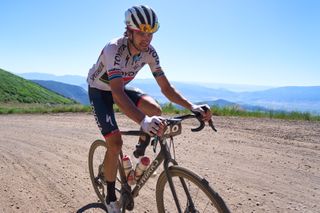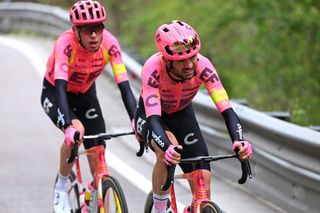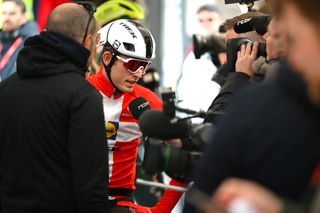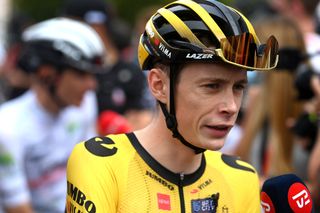Opportunity knocks at Vuelta a Espana 2019 – Race preview
Vuelta a Espana countdown: 5 days to go





After the Giro d'Italia and Tour de France, could the 2019 Vuelta a España see another new Grand Tour star make his way onto the highest step of the final podium on September 15th?
Just as outsider Richard Carapaz (Movistar) proved more than a match for the pre-race favourites at the Giro d'Italia, and inexperience was no obstacle for Egan Bernal (Team Ineos) en route to Colombia's first Tour de France victory in July, in the absence of many big names at the Vuelta this August, another power vacuum may well need filling.
It's true that four former Grand Tour winners – Carapaz, Fabio Aru (UAE Team Emirates) and Movistar duo Alejandro Valverde and Nairo Quintana – will be present on the Vuelta's start line in Torrevieja on Saturday. But this year, too, there's no getting around the glaring absence of a long list of potential GC contenders from the Vuelta's usually star-studded line-up.
There's no Chris Froome – still recovering from his serious crash at the Critérium du Dauphiné in June – which means that the Vuelta is missing its most consistent participant, as well as a former winner. Froome's Team Ineos teammates Geraint Thomas and Bernal are also not taking part, and neither are Tom Dumoulin (Sunweb) or Vincenzo Nibali (Bahrain-Merida). Nibali's relationship with the Vuelta, let's not forget, stretches all the way back to his maiden Grand Tour win in 2010.
On top of that, the 2019 Vuelta will be lacking both defending champion Simon Yates (Mitchelton-Scott) and his teammate and brother – and lynchpin in Simon's victory last year – Adam Yates. Neither of France's top stage-racing names, Thibaut Pinot (Groupama-FDJ) or Romain Bardet (AG2R La Mondiale) are taking part, and nor will Mikel Landa (Movistar), Dan Martin (UAE Team Emirates) or Richie Porte (Trek-Segafredo).
In a kind of negative milestone, in fact, as 2019 will be the first Vuelta a España since 2013 without a former Tour de France winner on the start line.
An open race
This doesn't mean that the 2019 Vuelta is going to be lacking in interest, however – not by a long shot. Rather, it makes this year's race a golden opportunity for new or new-ish faces to shine, for riders whose careers have never quite lived up to expectations to finally to make good, or for riders on the comeback trail to regain some much-needed momentum. Or, maybe, for Nairo Quintana to round off his time at Movistar by winning a long-awaited third Grand Tour.
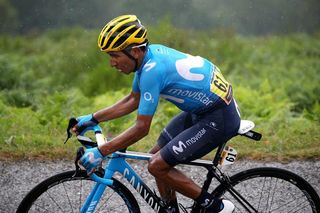
One striking recent example of how this 'power vacuum' scenario has previously worked in the Vuelta's favour was in 2015, when that year's Tour de France winner Chris Froome crashed out injured and Vincenzo Nibali was sent home early for taking a tow.
The ensuing ding-dong battle between Fabio Aru and Tom Dumoulin, with occasional cameos from Mikel Landa and Joaquim Rodriguez, went right down to the wire in the sierras of Madrid and was widely viewed as one of the most exciting Vueltas of the last decade.
Four years on at the Vuelta, the three teams that look, at least initially, most likely to dominate the overall battle are Jumbo-Visma, Mitchelton-Scott and Movistar.
Jumbo's line-up of Primoz Roglic and Steven Kruijswijk, with a solid line-up of lieutenants like George Bennett, Sepp Kuss, Tony Martin and Robert Gesink, could well make them the Vuelta's squad to beat. But Mitchelton-Scott have real strength in depth, too, headlined by Esteban Chaves and Mikel Nieve, whilst Movistar will be fielding no fewer than three Grand Tour champions: Giro d'Italia winner Richard Carapaz alongside defending world road race champion Alejandro Valverde and Nairo Quintana.
After this year's tumultuous Tour, the expression 'trident of leaders' is probably banned from being used anywhere within a 50-yard radius of the Movistar team bus. But with three big names for the Vuelta, that remains one possible leadership strategy for the Spanish team, and quite how Movistar play their trump cards will arguably matter more this September than it did in July. That's because whereas they were one of many GC contenders in the Tour de France, Spain's sole WorldTour squad is traditionally the key powerhouse in their home race of the Vuelta, and this year won't be any different.
Other teams with potentially serious GC ambitions include AG2R La Mondiale with Pierre Latour, who's finally looking in shape after a very difficult first half of the season. Team Ineos arrive with young, up-and-coming racers like Tao Geoghegan Hart, and could quickly become frontrunners, too.
Astana's Grand Tour specialist Miguel Angel Lopez is sometimes inconsistent but never uninteresting as a racer, and with no Dumoulin, Team Sunweb's Wilco Kelderman has a chance to up his GC ratings as well. Last but not least, there's Italy's perennial comeback kid-no-longer, 2015 Vuelta a España winner Fabio Aru at the head of UAE Team Emirates.

A special mention should probably also go to the broad-based challenge presented by EF Eduction First. The US WorldTour team's mixture of veterans like Rigoberto Urán and Tejay van Garderen will be backed up with two hugely promising young Colombians – Sergio Higuita and Dani Martinez – and British climber Hugh Carthy. If the American squad is on song, they could suddenly barge their way into the Vuelta's GC limelight with a vengeance.
Sprint battles
In the bunch sprints, the headline name is undoubtedly Fernando Gaviria (UAE Team Emirates), presumably itching to put what has been an uneven and injury-blighted season so far on the straight and narrow in his first ever Vuelta a España. Sam Bennett (Bora-Hansgrohe), fresh from crushing the opposition with his three stage wins at the BinckBank Tour, will likely be Gaviria's most difficult rival in his own Vuelta debut, while Dutch national road race champion Fabio Jakobsen (Deceuninck-QuickStep) is another man to watch in the sprints.
After two stunning wins at the Tour de Pologne, Slovenian Luka Mezgec (Mitchelton-Scott) is clearly in great form right now for the tougher bunch gallops, where another veteran, John Degenkolb (Trek-Segafredo) could also well be in with a shout on similar terrain.
For the transition stages and uphill finishes, Philippe Gilbert (Deceuninck-Quick Step) needs no introduction, while the Belgian WorldTour squad is a solid outside bet for victory in the opening team time trial, too.
Eight summit finishes
If the Vuelta's line-up looks very different to usual, the race route has maintained its signature feature of a seemingly unlimited supply of summit finishes, albeit reducing them from nine to eight from 2018 to 2019.
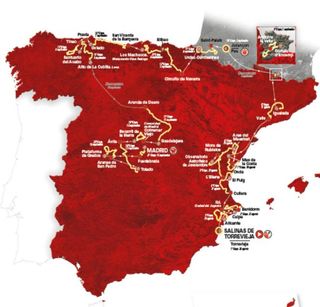
With no fewer than four of those summit finishes coming in the first nine days, it seems like a given that a climber will come to the GC-fore early on. However, past Vuelta history has shown that such an intense start could lead to an overly conservative opening week, with advantages gained from the GC battles sometimes measured in seconds, not minutes, until deep into the race.
Teams looking to establish bigger differences will have the usual opportunities galore – although another perennial question in the Vuelta is whether they take them. After a short opening team time trial on Saturday to set up some sort of GC hierarchy, stage two through the rolling hills of south-east Spain could easily reduce the front peloton to four or five dozen riders, and stage five to Javalembre, with a single 12-kilometre-long climb after some approach roads through perpetually rolling terrain, may well see at least one or two GC contenders in trouble.
But the first real crunch stage could be stage nine in Andorra – a 100-kilometre non-stop series of climbs ending in the brutally difficult Cortals d'Encamp. At 36 kilometres, stage 10's rolling mid-race individual time trial at Pau is then long enough to create some serious differences, but, whatever happens, the boot will definitely be back on the climbers' foot at the end of week two, with three major mountain stages in four days.
The ascent of Los Machucos, on stage 13, is one of the most complicated climbs of northern Spain, both steep enough and long enough to do some real GC damage, as Chris Froome found to his cost in 2017. Then there are two back-to-back summit finishes on stages 15 and 16 to El Acebo and Cubilla. El Acebo is regularly used in the Vuelta a Asturias stage race, but never before in the Vuelta, and it culminates what is probably the toughest single day of the entire race. As for Cubilla, it's a kind of Spanish Val Thorens in terms of length, if not altitude, and together with El Acebo and Los Machucos, the trio of northerly mountain stages should leave a solid overall hierarchy in their wake.
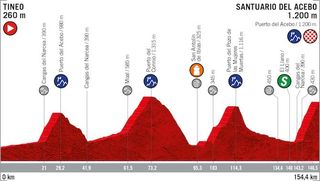
But the party ain't over even then, given that two more big days of climbing in week three could yet up-end the Vuelta GC yet again. On stage 18, the classic combination of Navacerrada, La Morcuera and Cotos in the sierras of Madrid represents a timely return to some of the best-known climbs from the Vueltas of the 1980s and 1990s. And stage 20 takes the Vuelta into the Sierras de Gredos in western Spain, where Bernard Hinault ripped the Vuelta apart in 1983 in what he would later describe as his hardest-ever Grand Tour win – and he took 10 of those.
Stage 20 is sandwiched between two other historically important days for the Vuelta: stage 19 will visit Toledo, home of Federico Martin Bahamontes, to pay homage to cycling's greatest-ever climber on the 60th anniversary of his Tour de France win. The cobbles on a short, steep uphill finish at Toledo's Plaza de Zocoveder could well be to the liking of riders like Gilbert. Then the curtain closer of stage 21 will be the 50th edition of a Vuelta stage finish in the country's capital, Madrid.
Such varied terrain and constant opportunities for GC battles has its attractions – although others might lament the ongoing demise of transition stages. But given that the Vuelta's GC tends to be decided by seconds rather than minutes, a lot of the outcome tends to hinge on which team controls the race at any given point, and how well they do it.
Last year in the first two weeks, by their own admission, Mitchelton-Scott were not the strongest team in the race, even if Simon Yates became the overall winner. But thanks to squads like Cofidis and Groupama-FDJ – who had brief spells in the leader's jersey – and, above all, Movistar clamping down on dangerous breakaways and maintaining the status quo, Yates was able to bide his time and conserve his strength before establishing a definitive advantage in the Pyrenees, with only three days to go to Madrid.
Therein, maybe, lies much of the beauty of the modern-day Vuelta: the narrowness of the GC margins for so long helps maintain the tension of the outcome right up until (almost) the last possible moment. And this year, when there is a serious opportunity for new challengers and so few well-known GC 'names,' that margin of uncertainty about the final outcome could be even greater than usual. And who's going to complain about that?

Thank you for reading 5 articles in the past 30 days*
Join now for unlimited access
Enjoy your first month for just £1 / $1 / €1
*Read any 5 articles for free in each 30-day period, this automatically resets
After your trial you will be billed £4.99 $7.99 €5.99 per month, cancel anytime. Or sign up for one year for just £49 $79 €59

Join now for unlimited access
Try your first month for just £1 / $1 / €1
Get The Leadout Newsletter
The latest race content, interviews, features, reviews and expert buying guides, direct to your inbox!
Alasdair Fotheringham has been reporting on cycling since 1991. He has covered every Tour de France since 1992 bar one, as well as numerous other bike races of all shapes and sizes, ranging from the Olympic Games in 2008 to the now sadly defunct Subida a Urkiola hill climb in Spain. As well as working for Cyclingnews, he has also written for The Independent, The Guardian, ProCycling, The Express and Reuters.
Most Popular
Latest on Cyclingnews
-
Matt Beers: Coming off Cape Epic win, I'm pretty confident for Sea Otter
South African gravel and marathon MTB champion focused on Life Time Grand Prix do-over in 2024 -
British science and French panache: Simon Carr finds the perfect balance at Tour of the Alps
EF Education-EasyPost rider bounces back with 45km solo win after doubting his fitness on opening two stages -
Skjelmose recovered from hypothermic reaction, eyes Liège-Bastogne-Liège podium
'It was one of the most uncomfortable moments of my life' Dane recovers quickly from cold at Flèche Wallonne and already rides recon for Monument -
'Walk first, ride indoors and then on the road' - Jonas Vingegaard's road to recovery after Itzulia crash
'In two weeks, we'll know what is possible' - Visma DS Frans Maassen on Dane's chances of riding the Tour de France

